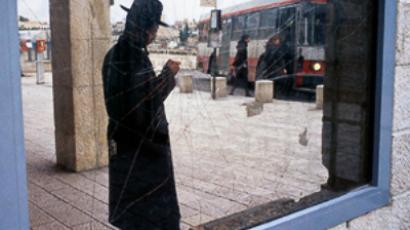The Israeli bus battle of the sexes
Women’s rights are being taken for a ride by a minority of ultra-Orthodox Jews in Israel. Female followers are often forced to sit at the back of buses in their own specially segregated section.
What would be a straightforward means of transport in other parts of the world is a rather trickier trip in the Israeli capital.
Feminist activist Avital Feldman no longer catches buses in Jerusalem, as Orthodox Jewish customs mean she is often ordered to sit at the back with the women – not in the front with the men.
“I would get on the bus, sit in front and then some guy would come and just tell me ‘go to the back’, he wouldn’t even ask, he’d just tell me ‘you have to go to the back’. And I would say why should I have to go to the back? I would say your rabbis have no authority on me, I don’t believe in them, I’m staying here, and they’d start yelling at some point,” Feldman says.
Tensions between religious and secular Jews have been simmering for years. They are now starting to boil over. One-fifth of Jerusalemites are ultra-religious and now want separate buses with separate entrances for men and women.
Jerusalem City Council Member Rabbi Shlomo Rozenshtien notes that, according to Jewish law, men and women cannot sit together:
“When a religious man passes a woman on the street, he can cross over to the other side. But in a bus where people sit very close together he has nowhere to go. If suddenly the bus brakes and a man touches a woman, it’s forbidden,” Rozenshtien says.
However, most Israelis are secular and say the ultra religious want to transform Jerusalem into a Jewish version of Tehran. They complain it is their tax money that runs these buses – and the religious community already has nine of them. Furthermore, it is sexist and humiliating and for women.
Laura Wharton, secular member of the Jerusalem City Council, says:
“This is the way the world. If you find it difficult to be with women who are near you or who are touching you even or dressed in a way that you are not accustomed to, you have to keep your distance and it’s your problem, and if ultimately you feel you can’t deal with the situation of being close to women who are strange to you, you should walk.”
Ester Sigal is a religious woman who hosts her own television show and teaches Judaism. She says one solution could be to run religious buses only in religious areas.
“The rabbis are divided. Some say it’s unavoidable for a man who is forced to share a bus with a woman not to think about her, whereas he should instead be thinking about God. Other rabbis are more modern and say it’s just a bus ride, nothing more,” Sigal says.
While some on the streets of Jerusalem brand the issue as “much ado about nothing”, others say it is the rabbis who need to move in the bus if they feel uncomfortable.
Not so long ago an old woman was allegedly beaten up when she said she could not walk to the back of the bus.
RT’s Paula Slier decided to check things out for herself, and got onto one of these ‘religious buses’ to see what would happen. After she asked a religious man if she can sit down next to him, he got up, and walked away.













